Big Question Survey 2023 results
Section 1: Pay/pensions
Pay remains an issue of absolute concern to teachers, with four in five teachers responding negatively to the questions we asked about teachers’ pay.
Eighty-nine per cent of teachers are worried about their financial situation in this year’s survey, up 2% on 2022’s response.
Teachers continue to say they are cutting back on everyday expenditure and, significantly, 62% are cutting back on food spending, an increase of 10% on the previous year.
For the first time this year, we asked teachers whether they had been forced to cut back on heating costs - with almost two thirds saying that was the case.





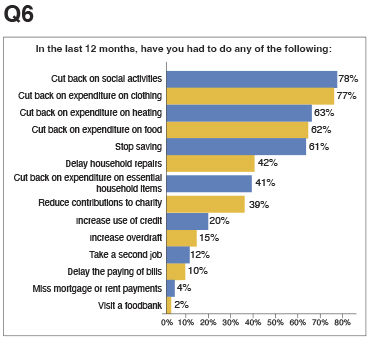
Section 2: Pupil health and wellbeing
Practically all teachers teach pupils with mental health challenges and almost nine in ten teachers think these challenges have increased over the last 12 months.
It is incredibly concerning, therefore, that almost 80% of teachers feel that appropriate support is not available to help them address pupils’ mental health issues.
This year, we joined with the NSPCC to ask teachers questions on safeguarding issues.
We found that 55% of teachers think that the number of safeguarding concerns in their school has increased in the last year and 71% think they have increased since the pandemic.
On a more positive note, over four in five teachers said they felt supported to make referrals related to safeguarding.





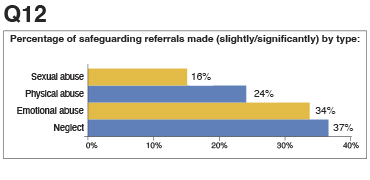


Section 3: Working practice and pupil behaviour
Pupil behaviour concerns have seen an across-the-board increase for teachers this year.
In all categories, teachers are more likely to report that a behaviour problem is a concern than previously, with some categories (including swearing/abuse and failure to comply with uniform policy) seeing increases of 10% and above.
The problems which cause teachers the most problems on a day-to-day basis continue to be low-level disruption such as backchat, chatter in class and inability to follow rules.
However, disturbingly, violent behaviour categories have also seen marked increases.
Most worryingly of all, there has been a 3% increase in teachers experiencing physical assault by a pupil and almost one in five teachers are having to deal with threatening behaviour on a daily basis, up 5% on 2022.
As with last year, we find that almost one in three teachers feel that their school’s behaviour policy is not fit for purpose.
The survey continued to ask a short question on remote learning, to understand how schools are continuing to use it post-pandemic.
Teachers reported that the main reason online teaching is used is for unplanned closure days, but we also find a significant majority of teachers say their school is using it for teaching pupils in isolation or with mental health needs.
Moreover, very few teachers are given extra time to prepare for these remote lessons.
A series of questions on the condition of school buildings was introduced this year.
This found that whilst more teachers think that their school buildings are in good condition 30% think the buildings are in a poor or very poor condition.
Two in three teachers say that they are having problems with extreme temperatures in their classroom, whilst issues with ventilation and lack of welfare facilities are a significant issue in many schools.
Question 15
| 77% | Inability to follow rules |
|---|---|
| 70% | Pupils with irregular attendance patterns |
| 68% | Chatter in class |
| 65% | Failure to complete work (including homework) |
| 63% | Backchat |
| 61% | Late arrival at lessons |
| 53% | Failure to bring appropriate equipment |
| 47% | Swearing/verbal abuse |
| 45% | Failure to comply with uniform policy |
| 37% | Distraction of mobile phones (e.g. texting, cameras) |
| 30% | Discriminatory language |
| 27% | Violence between pupils |
| 27% | Bullying between pupils |
| 21% | Threatening behaviour |
| 16% | Physical assaults on teachers |
| 9% | Distraction of other portable electronic devices (e.g. iPad) |
| 5% | Not following Covid-specific hygiene and social-distancing measures |
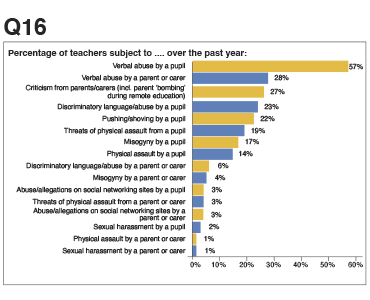

Question 18
Question 18 was an open response question for teachers.
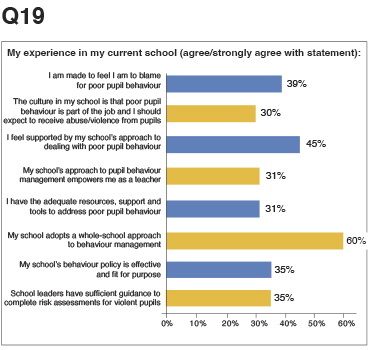
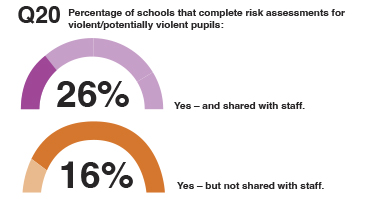
Question 21
| 59% | Unplanned school closure days |
|---|---|
| 49% | Pupils who are in seclusion/isolation |
| 45% | Pupils who have been suspended |
| 43% | Parents’ evenings |
| 34% | Pupils with mental health needs (e.g. anxiety) |
| 32% | Pupils with SEND/ASN/ALN who struggle with the social aspects of school |
| 30% | Pupils who are school phobic |
| 9% | Pupils in another school to access curriculum subjects not taught at their school |
| 7% | Pupils in several groups to be taught at the same time |



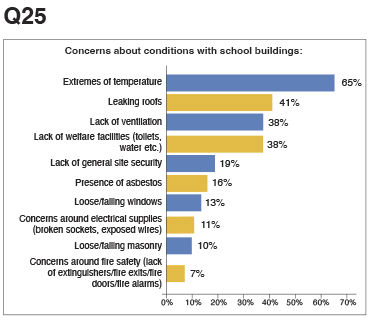
Section 4: Bureaucracy and workload
Fifty-two per cent of the teachers surveyed said that their workload had increased significantly over the last year.
Shockingly, teachers also reported working 52 hours in a typical work week, six hours more than they reported on average in 2022.
As in last year’s survey, admin and clerical tasks and pastoral care were given as the biggest drivers.
More teachers continue to feel disempowered and the main reason given for this was constant change in the profession, which was also the top reason in the 2022 survey.
Teachers also report that they are spending more time dealing with parents than in previous years and that they are being deployed to teach subjects/groups for which they have had no training.
Finally, similarly to other parts of this survey, there has been an increase in the reporting of offensive behaviour towards teachers in the last 12 months, which is adding to teachers’ feelings of disempowerment.



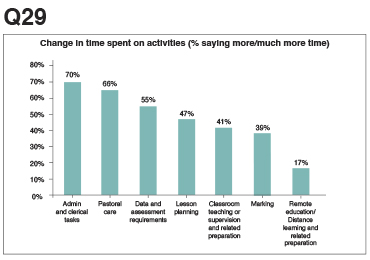
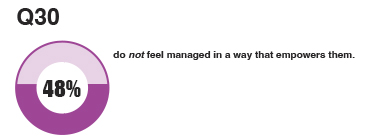
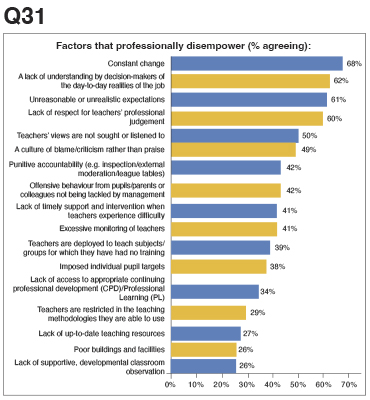
Section 5: Teaching quality
Teachers are clear in their support for qualified teacher status (QTS) (in England) and a contractual entitlement to CPD.
However, teachers are still giving up considerable amounts of their own time to access CPD, with teachers spending almost as many hours of their own time as they do in contracted time.
It is worrying that 17% of teachers have had their requests for CPD refused in the last 12 months, a slight increase on 2022.
The downward trend for teachers to be threatened with capability procedures continues, with a further decrease of 1% from last year, making this a cumulative decrease of 5% from 2019.
The number actually subject to capability procedures remains the same at 4%.










Section 6: Your health and wellbeing
The general deterioration in teachers’ health and wellbeing since the pandemic struck has continued.
Four in five teachers say that they experience more workplace stress and that their job is adversely affecting their mental health.
The biggest drive for this is increased workload - followed by poor pupil behaviour.
More than 60% of teachers report that teaching is affecting their physical health and more than half say that they are experiencing headaches or back pain as a result of work.


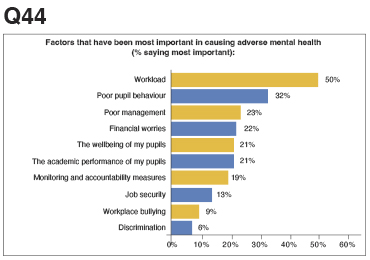
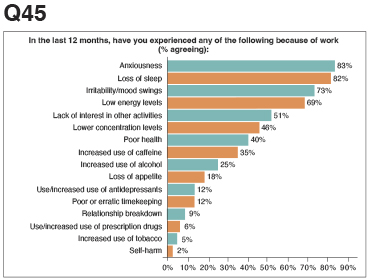

Question 47
| 72% | Headaches |
|---|---|
| 51% | Back pain |
| 41% | Neck pain |
| 21% | High blood pressure |
| 18% | Other |
| 13% | Frequent nausea |
| 10% | Other Musculoskeletal (MSK) disorders |
| 7% | Carpal tunnel syndrome |
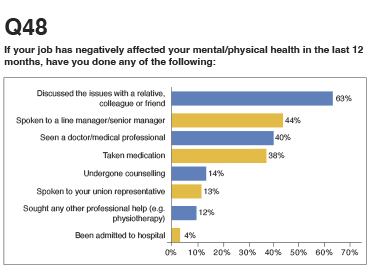

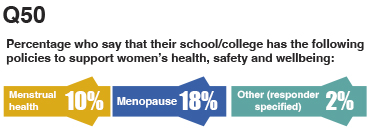
Section 7: Job satisfaction
The effect of the extra strain and workload is having an effect on teachers’ daily morale.
Not only do most teachers report that they are often too worn down to give their job their best effort, but this also has an impact on their home and family life.
More than three quarters of teachers surveyed say they have been unable to separate their work and home life since the start of the pandemic.
Most teachers are not satisfied with their job and 69% of teachers are considering leaving the profession entirely.
Teachers’ top concern remains workload.
However, this year, pupil behaviour and indiscipline has overtaken pay as the second concern of key importance to teachers.

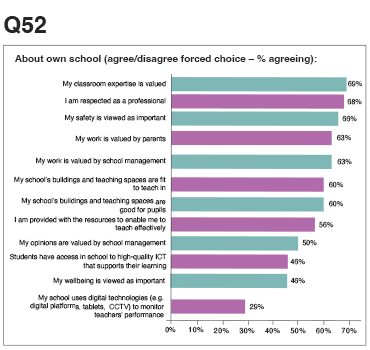
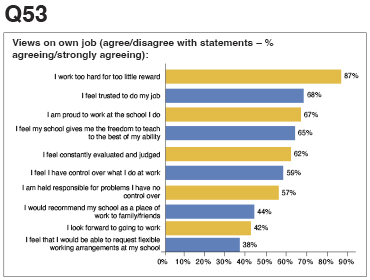
Question 54
| 83% | I feel too tired after work to enjoy the things that I would like to do |
|---|---|
| 73% | I find that my partner and/or my family/friends often get frustrated with the pressure of my job |
| 70% | I am often too worn down to give my job my best effort |
| 34% | I have the space to devote time to my partner or family/friend |
| 24% | I am able to relax at home and to switch off from my work |
| 26% | I have been able to separate work and home life well since the start of the pandemic |


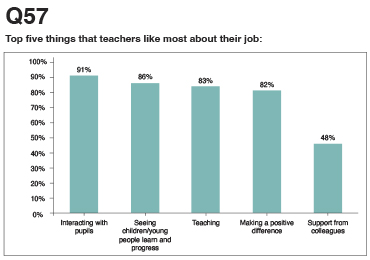
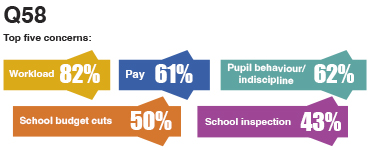




Previous Big Question survey reports
The NASUWT works with the Open Data Institute (ODI) to record the experiences of teachers.
You can download reports from previous years’ surveys or explore the 2023 data further on the right/below.
Why do we ask the Big Questions?
The NASUWT’s Big Question Survey is the only annual, national survey of teachers and headteachers and your responses provide a unique insight into the challenges you face throughout the year.
We are acutely aware that many of you already support the NASUWT by completing surveys, but this remains the most important one for our Union’s vital work.
With your help, we gather crucial information on the difficulties faced by teachers, students and families and their impact upon education and wellbeing.
The Big Question time series offers the only nationally available dataset that tracks trends in teachers’ and school leaders’ opinions over time by collecting the views of teachers and school leaders across the UK, the Channel Islands and Gibraltar, on a range of subjects, including:
-
pay and pensions;
-
pupil health and wellbeing;
-
pupil behaviour;
-
bureaucracy and workload;
-
teaching quality;
-
your health and wellbeing; and
-
job satisfaction.
Demonstrating the developing views of teachers and school leaders and the issues that impact their work, the survey is a unique opportunity to highlight the changing opinions of teachers and school leaders over several years.
By completing the Big Question Survey, you help to provide robust evidence for the NASUWT’s national campaigns and lobbying of governments and employers to ensure teachers receive the support they deserve.
Your feedback
If you require a response from us, please DO NOT use this form. Please use our Contact Us page instead.
In our continued efforts to improve the website, we evaluate all the feedback you leave here because your insight is invaluable to us, but all your comments are processed anonymously and we are unable to respond to them directly.

